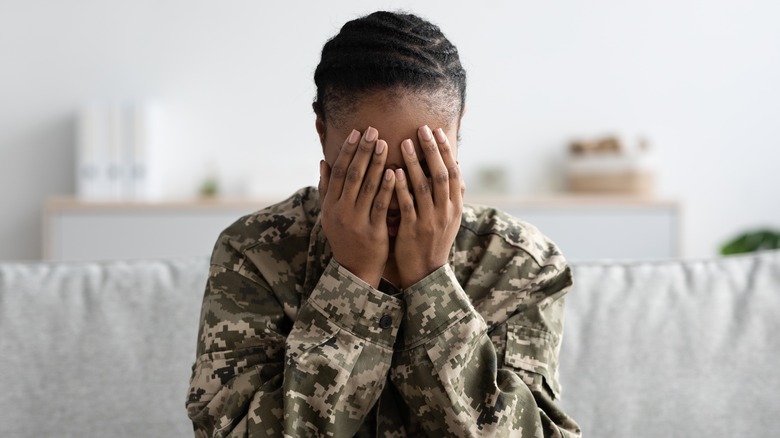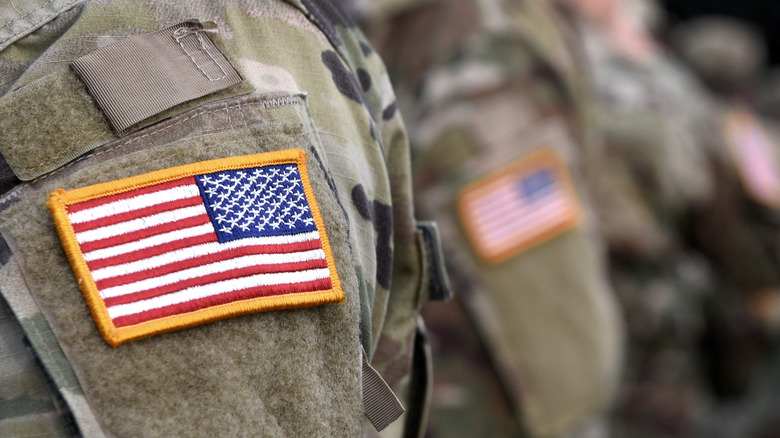The Strange Controversy Surrounding LaVena Johnson's Death
On July 19, 2005, Dr. John Johnson and his wife, Linda, received devastating information from a soldier who knocked on their door. Their daughter, 19-year-old LaVena Johnson, had died, and it was implied that she took her own life. As reported by Hue and Cry, the Johnsons couldn't believe the news. LaVena was a soldier stationed in Balad, Iraq, and just a couple of days prior to her death, she communicated with her family and was looking forward to coming home for Christmas that year. LaVena's father had an inkling that something else about his daughter's death was being withheld from them.
The following day, the Johnsons received a call from a general, who told them what happened to their daughter on the day of her death. LaVena started her day doing her usual work and finished at about 5 p.m. She was scheduled to attend physical training after work, but she never showed up (Medium). Someone was sent to get her from her room, but she wasn't there, and a search for her started. She was eventually found inside a contractor's tent lying on the ground in a pool of blood with an M-16 rifle beside her.
LaVena Johnson's background
LaVena Johnson was born on July 27, 1985, to Dr. John Johnson and Linda Johnson. LaVena was the fourth of five children and had a close relationship with her family. She was a good student and had dreams of going to college to study the arts and become a movie producer. According to a profile her father wrote about her, LaVena changed her mind and decided to join the Army instead. She and her younger sibling would be attending college at the same time, and she wanted to ease the financial burden on her parents. The Johnsons were initially opposed to the idea, but LaVena told them that it was a way for her to serve her country while also earning her own money to pay for her college tuition.
After graduating high school in 2004, she enlisted in the Army and did eight weeks of basic training in South Carolina. In May 2005, LaVena was deployed to Balad, Iraq, where she worked in the communications building. She made it a point to update her family about how she was doing and what was going on in regard to her work. Eight weeks later, her family was told that she was dead.
Problems at work
In one of the updates the Johnsons received from LaVena, their daughter told them about how she felt mistreated and disrespected by her superiors. However, she told her parents not to worry, as everyone was treated the same way, and she wasn't singled out (via Medium). In the weeks following, she wrote several letters to home that updated her family on what was happening, but overall, her tone seemed optimistic. It was in January 2005 that she called her father — a service veteran — at home to get advice regarding a specific incident.
LaVena told her father that she was having difficulty getting some of the soldiers to obey her, and the general reprimanded her for her failure to control the soldiers. LaVena said that her superior didn't support her, and she felt attacked. John advised his daughter to find someone she could trust and to always watch her back. The last time the Johnson family talked to LaVena was on July 17, 2005, as his father told Protect Our Defenders. She called home to tell them that she would be home for Christmas and not to decorate the Christmas tree before she arrived, as she wanted to do the tradition with them.
Evidence of a suspicious death
The U.S. Army suggested that the Johnsons have a closed-casket funeral for LaVena Johnson. However, her parents wanted to see their daughter one last time and opted for an open-casket funeral. Discrepancies between what the Army told the family came to light when they saw her body. As reported by Hue and Cry, LaVena looked like she had a broken nose, marks on her neck, and broken teeth that appeared to be caused by a violent struggle with someone. There was a small gunshot wound on the side of her head, but the Johnsons were told that LaVena had shot herself in the mouth.
According to journalist and retired trial lawyer Donald Watkins, LaVena had no gunshot residue on her hands despite having supposedly shot a gun, and her fingerprints were not found on the firearm found at the crime scene. John Johnson had a difficult time getting his daughter's autopsy report from the Army, and when he acquired it months later, it looked like the medical examiner who performed the autopsy worked on the assumption that it was a suicide. Scraping from LaVena's fingernails wasn't taken and she wasn't tested for sexual assault. The Johnsons hired an investigator to look into their daughter's case, and when they acquired the case documents, the crime scene photos showed heavy bruising on her face, which suggested that she was hit.
The Army's claims
The Army said that LaVena Johnson showed signs of depression shortly before her death. They claimed that she had been upset after her boyfriend broke up with her. The Army stood by its statement that LaVena died by suicide. "CID's (Criminal Investigation Command) extensive investigation found PFC LaVena Johnson's death to be from a self-inflicted gunshot. This finding coincides with the opinion rendered by the Office of the Armed Forces Medical Examiner, whose findings also determined the death to be from a self-inflicted gunshot," the statement read, as reported by NPR.
However, after seeing the body of LaVena and based on their conversation with her shortly after her death, they believe that she was murdered. Her father, John, said it's possible that LaVena was murdered by a fellow service member and the Army orchestrated a cover-up, most likely because it was perpetrated by a high-ranking official. According to the New Pittsburgh Courier Online, the Army promoted LaVena to Private First Class and honored her with awards, including an Army Commendation Medal and Good Conduct Medal after her death.
The Johnsons' call for justice
Years after LaVena Johnson's death, her family is still seeking for the truth about what happened to her. They firmly believe that she didn't die by suicide, and they want justice for their daughter. John Johnson told St. Louis Public Radio in 2015 that LaVena was looking forward to coming home for the holidays the year she died, and she was optimistic about the future. Her mother, Linda, said that LaVena was excited about going home and asked her to make sure her father didn't start decorating before she was home. "This was not a girl getting ready to harm herself," Linda told the Los Angeles Times.
The Johnsons have never stopped seeking justice for the death of LaVena. They continue their efforts to spread awareness about LaVena's case and in 2021, Linda told NBC News that they are hoping someone to come forward with important information that will convince the CID to reopen the case. "It's important that her name is not forgotten. She deserves better. She deserves justice," Linda stated.





